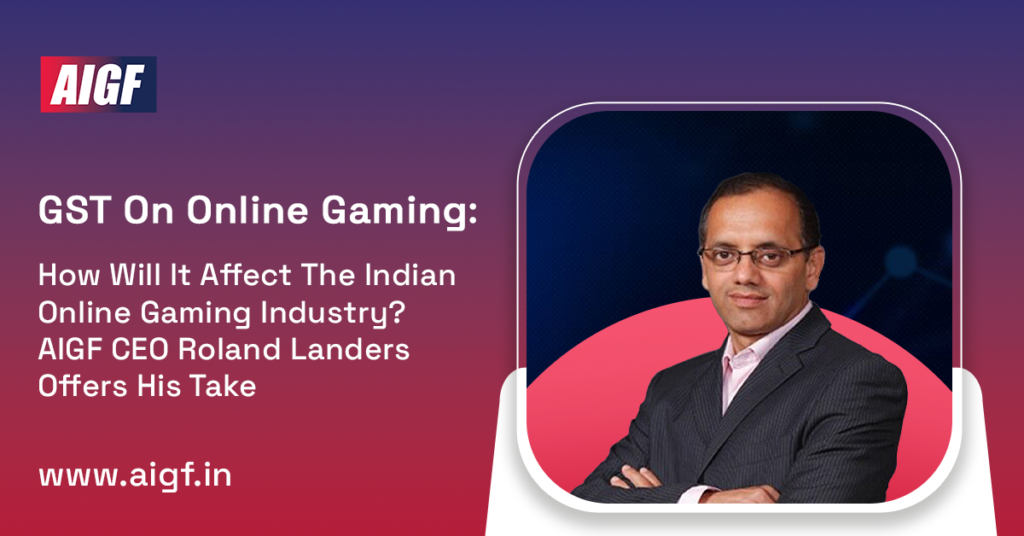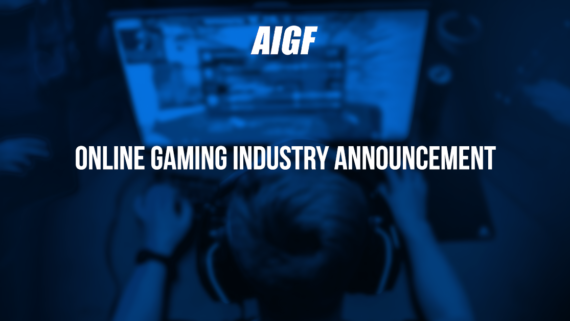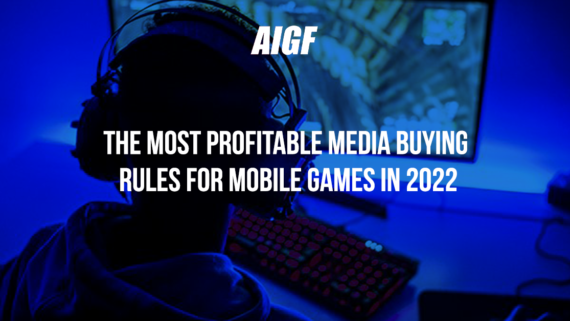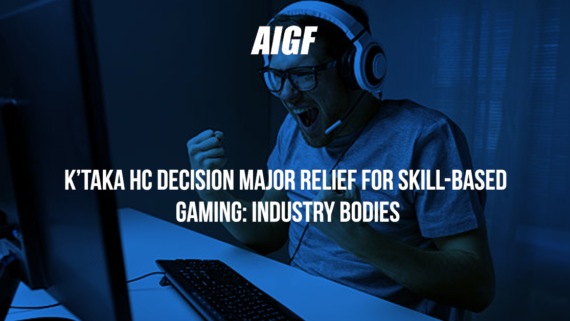In India, online gaming is a club together with casinos and horse racing. And as such, it is largely considered to be assimilable to online gaming, including even skill-based games by the center. The GST Council is looking to impose a 28% tax on online gaming, casinos, and horse racing. So how will that work? Whom will it affect the most? And more importantly, is it fair? Here’s Roland Landers’ (CEO of All India Gaming Federation) take on the impact of 28% GST on the overall sector.
GST On Online Gaming: How Will It Affect The Indian Online Gaming Industry? All India Gaming Federation CEO Roland Landers Offers His Take
In India, online gaming is a club together with casinos and horse racing. And as such, it is largely considered to be assimilable to online gaming, including even skill-based games by the center. The GST Council is looking to impose a 28% tax on online gaming, casinos, and horse racing. So how will that work? Whom will it affect the most? And more importantly, is it fair? Here’s Roland Landers’ (CEO of All India Gaming Federation) take on the impact of 28% GST on the overall sector.
Could you please explain why it makes sense to combine online games with casinos and horse racing in India? And from that, can I explain to our listeners how online gaming or skill-based gaming is different from gambling?
Thanks for having me here. It does not make sense. The Supreme Court of India and various high courts in the last 65 years have repeatedly clarified that games of skill are legally and constitutionally very different from gambling.
Online games of skill are games that predominantly involve skills such as superior knowledge, strategy, memory recall, etc. A lot of these skills and talents are mine. Handling predominantly involves chance, where the results are out of the gambling event.
Right. So, could you explain it a little bit more? Do you think online Rami or online TeenPati and games like that should be treated the same? Well, they aren’t, but why do you think the government or the center treats them the same as something like online chess or online puzzles? Why do you think this is a situation like that?
So there are different categories. If you put these talents and skills together and match them again, that constitutes for a participant to undergo and apply these various skills and talents, then you can categorize and also depend on the various high court and supreme court judgments of the past.
Card games, strategy-based card games, online rummy, online poker, fantasy gaming, a slew of casual-based games, some of which can be found on platforms like MPL, and, as you mentioned, quizzing are examples of games of steel in the current era. There are spot-based online versions of even carom, for example. All of these, where these skills and talents have to be applied by the gamer, are what constitute the games of skill and what comes under the purview of the All India Gaming Federation as far as the self-regulation mechanism. We are talking about a pay-to-play format, right? Where a participant or a gamer is paying to participate, much like a consumer paying for the music of their choice, or maybe the content of their choice, Similarly, a gamer is paying to participate in a game of his choice, which is a game of skill.
So even if we play something like Candy Crush or something, even then we get an extra life or extra turn, we have to pay like 5-10 rupees. So even that is also a pay-to-play format.
There is a pay-to-play format that is inside the app once again, once you reach a certain level. That is also one form of monetization.
So the GST Council has already met with representatives from the online gaming sector to understand the key difference between skill-based gaming and online gambling. Could you give us an idea of what happened in the discussions? And what is India’s legal stance currently on the difference between skill-based gaming and online gaming?
So first, let me give you the legal stance. So, as I mentioned earlier, the games of skills at a very high level involve the predominance of skin, and we are protected under it. Article 19 (1)(g) of the Constitution As repeatedly mentioned, these are legitimate business activities. Now, what we are seeing in the past, let’s say a year and a half ago, is that there were states that were issuing certain kinds of amendments to their state, giving laws and bringing about new laws and amendments that they kind of wanted. To stop these activities just because a gamer was paying to participate in the game. The states can no longer enforce this ban. This has been shown and proven by the high courts; the honorable high courts of Madras, Karnataka, and also Kerala. So now what I’m doing is when gambling is wrongly transferred, which is not covered under legitimate business activity. So one is that a game of skill is a legitimate business activity. A game of chance is not, and that can be banned by all means by states, but not the former, which is a game of skill. Now, referring to the interaction that we’ve had with the GM, we are grateful that the GM opted for an open approach with an open mind. I wanted to meet them so badly that we had the opportunity to meet them. I want to present this legal background that I just told you about and why the online skill gaming business should not be considered. should not come under the ambit of an accident claim as it does in the case of the lottery, betting, and gambling We were able to present our views. And we are happy that those have been accepted because they’ve taken the input. from us and in active discussion on the way forward.
So what was the outlook like? What was the response like at first when you made the representation?
They are approaching this in a very open manner, which is good and is also good because that’s when both sides get to discuss issues that they probably have in their minds and which they were able to articulate to us. And then we were able to put forth our point of view and also the point of view that I just mentioned. At the outset of this business of online skill gaming, the paperwork and the submissions and representation have been submitted and, as I said, it is under discussion currently.
Could you give us an idea of what the current taxes and structures for online gaming are in India? Like something like an MPL or other platform for online gaming? What is the sort of tax that they have to pay and how is it taxed up against something like the United States, the United Kingdom, or other countries?
That’s a good question. Since the implementation of GST in 2017, online gaming platforms have been paying GST on a fixed platform fee or GGR. This is Norman Glacier, which is used in the industry. GGR stands for Gross Gaming Revenue, or another term for it is a fixed platform fee. When a service is provided, a platform charges a fee, right? In the case of skill gaming, this ranges from 5 to 10% of the total prize price. Hence, the gamers participating in a particular online skill gaming format pay, and hence these fees go towards the infrastructure services and the games that are hosted by the plan. So 18%. So there are two parts to GST. One is the rate, and the second is, you know, valuation, or the applicability of that rate, correct? The rate paid by the industry is 18%. The application of the rate happens on the platform fee, as I mentioned, or gross gaming revenue. For example, if Rs 100 is what the 10 players contribute and the platform fee, assuming it is 10%, is what the gaming platform could hold or retain as a fee, Rs 10 will go back to the winners as per the ranking. The Rs 10 that is kept as a platform fee is what goes to the infra services of the games on the platform. So how does it stag up with global practices now? This practice applies, as I said, to both the rate and the valuation. The rate we are following is 18% since the introduction of GST, the applicability of which is on the platform fee or the GGR. This practice is being followed across all jurisdictions across the globe and it is universally accepted. There have been some media reports which say that GOM is considering that instead of the platform fee or the GGR The valuation should be on the contest entry, which is Rs 100, as I told you earlier in an example.
If a 28% GST is implemented, my first questions will be about how it will work, what kind of payment the gamer will have to make, and what kind of payment platform will have to make when the 18% becomes 28%.
As I said, GST has two parts when we look at the first part rate as per the media report rate So you have to remember that our first question was, “Have we been clubbed with horse racing and casinos?” These people are already the other two gaming businesses that are already paying a 28% rate. So uniformity, while we, as I mentioned earlier, are 18% for uniformity, there have been media reports that 28% would be applied to all the categories. GOM are the ministers. Most of them are finance ministers from seven different states, and the convener is the CM of Meghalaya, Mr. Comard Sangma. For many categories and industries, GOM has been formed to look at these 2 parts: the rate and the value. The rate part being 28% is what has been suggested in the media that it will be 28%. Now if we talk about valuation, we look at the variants. So if the application of the GST rate is applied or valued on the contest entry on the total amount, what will happen? The increase is going to be 1100%. That would be You know, a lot of your listeners would understand that I do not know any persistent or don’t know any other industry where there is an 1100% varier. It is very easy to see that this would hurt the entire ecosystem. What exactly is an online gaming ecosystem? From the beginning, the developer, all these games are in one place on the platform, like PayTM, the first game, MPL, all of these games when you go there. Then comes the gaming platform, and finally, gamers who participate, and, of course, there are investors and all those other people. For game developers, it is going to be extremely difficult. What happens is a lot of money generated as a profit goes to the enhancement or development. With an increase in the tax burden of 1100%, there will be less investment in innovation and game development. For the gamer, it’s going to be 300% inc for the participant, and that is also a large amount. For example, if he normally plays 300% of what he would normally play for his depositor amount to be able to play 10 games now with a 300% increase, he will be able to play that much. The player’s and the gaming platform’s engagement will be drastically reduced. Because of the tax burden and the percentage burden, he would be paying towards illegal gambling sites voluntarily. Because neither the platform pays the tax nor the gamer pays the tax. Direct and indirect taxes do not apply to illegal offshore gambling platforms.
As for the gaming platform, the hit is, as I told you, 1100%. So what happens is look at the game developer, the gamer, and the gaming platform’s entire ecosystem is going to be impacted adversely. And if you look at some of the others, for example, investors, the profitability where they invest in gaming companies are going to be questioned as to whether we apply the entire contest amount. If you look at the entire value chain, the entire ecosystem is going to be adversely affected.
Since we discussed unlicensed gaming or any other gray market of gaming, I spoke with a few people who were trying to understand the people’s nerves and what they were thinking if such a tax was imposed and official gaming fees increased that much. Most people are saying, “Okay, I will move on to some app and I will get more money. Could you please tell us, or share a word of caution, because what kind of security, data privacy, or financial risks can you give us when you explore gray market games or unlicensed games?
I have to consider the return of possible winnings and a lot of other things that one needs to keep in mind at the very least. I would say participating in an illegal offshore gambling platform is wrong and it is also anti-national. You know, because of the digital nature of the business, these operators do exist across the globe. But what happens is that, as informed people, we need to make the choice, but it has to go beyond keeping in mind the possibility of winning by participating and backing our skills. You need to keep in mind where your data is because you know data privacy. In any case, you are submitting your data about yourself. And because no laws apply to such a gray market, one must proceed with caution and refrain from filing complaints about such fraud.
What do you think will happen after the GOM interaction where you said how it also appears they are being cautious about not calling a 28% tax or not planning on online gaming? So there is a certain hope, a certain panel of people, or ministers and officers, who are looking at it in a very responsible way. So since you are into this and involved in this, could you tell us what might happen? Do you think 28% GST will be introduced or not introduced? And what do you think is the future of online gaming in India?
So, I think we have a great opportunity. I would look at the positive because, as you know, GOM is extremely open and transparent. I have approached this in a consultative manner, so as an industry we are extremely positive and the globally accepted practices and methodology have been adopted. So 28% of you know the industry as far as this rate is concerned. We await the final recommendation report. However, we are focused on the valuation. As for the valuation of the platform for the GGR, as I said, we have a great opportunity to compete globally. As you know, gaming is a rising industry. You know, GST is applied in this manner, the valuation that we have a great opportunity to compete globally and make games and products in India innovative and exciting enough to compete. We have a great opportunity. Finally, I want to add one line This industry, which is currently valued at $2 billion, would be irreparably damaged.
Credit: abp Live











Comments
Comments are closed.